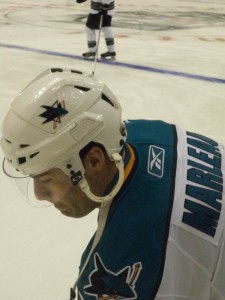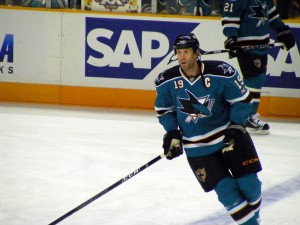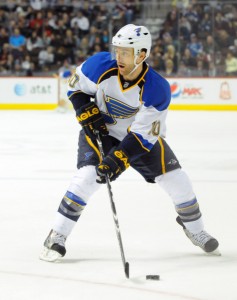
Battling back from a 3-1 series deficit is no easy task, but that is exactly what the Sharks will have to do in order to stay in the 2012 NHL playoff picture.
After winning the first game of the series, the Sharks have dropped three straight to the surging St. Louis Blues. The Sharks dropped Game 2 due to lack of scoring, as Blues goaltenders Jaroslav Halak and Brian Elliott combined to shut out the visiting team. Game 3 saw an outburst of scoring by St. Louis, including a goal and three assists from Andy McDonald. The Sharks’ late third period rally, including two goals in the final period, was not enough to overcome their deficit.
Thursday’s Game 4 was a defensive battle, as the Sharks had the narrow edge in shots-on goal, 25-24. B.J. Crombeen and Andy McDonald scored goals for the Blues and Sharks Captain Joe Thornton added a tally with just 1:07 remaining on the clock. The Blues prevailed with a 2-1 victory to go far into the driver’s seat with a 3-1 series lead.
The series shifts back to St. Louis Saturday night for Game 5 with a 7:30 EST start time.
Only 20 teams have ever been able to climb back from a 3-1 series deficit in NHL history (23 if you include the three teams that have overcome 3-0 series deficits). There have been a total of 229 NHL playoff series, meaning that only 8.7% of the time does the team facing elimination in this situation have come back to advance to the next round.
The Sharks have a laundry list of items to complete if they expect to be the 21st team in NHL history to beat the odds.
Improve the penalty-kill. Currently, the Sharks are tied for the second-worst penalty-kill in the playoffs. Posting just a 62.5% success rate (6 goals-against on 16 attempts), the Sharks can pinpoint this as their biggest issue heading into Game 5. St. Louis has moved the puck well, but they have proven all season long that their power-play can be stopped. The Blues tied for 19th in power-play percentage in the regular season (16.7%), while only having one player score over 20 power-play points (Alex Pietrangelo – 24). The Sharks did have the second-worst penalty-kill in the league this season (76.9%), but players like Brent Burns, Marc-Edouard Vlasic and Daniel Winnick are more than capable of leading a strong penalty-kill from this point forward.

Stop taking inopportune penalties. This ties into the first point. Twice in the past two games, the Sharks have taken bad penalties late in a game when they needed to be playing offense. Let me rephrase that; twice have the Sharks leaders and all-star players taken bad penalties late in the game to end a comeback. In Game 3, it was the team captain. Just .33 seconds after Sharks defenseman Colin White scored to cut the Blues’ lead to 4-2, Thornton seemed to tackle Blues Captain David Backes behind the play. Thornton was assessed a 2-minute roughing call at 17:31 of the third period.
Then former captain Patrick Marleau was the culprit in Game 4 when he ran Blues defenseman Kris Russell head-first into the boards when the puck was being played five feet from the play while the Sharks were on the power-play almost halfway through the third period (Blues led 1-0 at the time). The Blues received a man-advantage just .31 seconds later when defenseman Barret Jackman left the penalty box. Andy McDonald really made Marleau and the Sharks pay, scoring a power-play goal with just 8:00 remaining in the game. Needless to say, these penalties can be directly related to the Sharks’ inability to make a comeback during these dire situations.
Stop Andy McDonald. Most of the Sharks’ attention has been drawn to the T.J. Oshie – David Backes – David Perron line. In all reality, the real poacher for the Sharks has been Andy McDonald and linemates Patrik Berglund and Alex Steen. This line has contributed 81.8% (9-11) of the Blues’ goals in the post-season (Jason Arnott’s PPG in Game 3 came with

assists from McDonald and Steen while the entire line was on the ice). McDonald is currently the Blues’ team leader in points (7), while also ranking third in the league in the same statistic. He and Berglund lead the team with three goals as well. Some would say that the turning point of the series came when T.J. Galiardi hit McDonald high around the midpoint of the third period of Game 2. McDonald claimed that the hit cracked his helmet but it also seemed to give him a boost. 6 of his 7 points have come since the incident.
Beat the goaltenders. Easy enough, right? Through four games, both Elliott and Halak have allowed just six regulation goals on 106 shots (94.3 save %). This is where the big guns for San Jose need to step up. Take Game 1 out of the equation and the Sharks’ brightest and best have not really been a factor.
- Martin Havlat – 9 shots
- Brent Burns – 7 shots
- Ryane Clowe – 5 shots
- Patrick Marleau – 5 shots
- Dan Boyle – 4 shots
Want a comparison? Blues defenseman Kevin Shattenkirk had 11 shots in Game 1 alone. McDonald has 16 shots in the series. The Blues’ reliable players are getting the job done. With the exception of Thornton, the Sharks are not getting a lot of production from the guys that they need to be their best players.
It is a daunting reality for San Jose heading into Saturday. If they do not improve in the aforementioned areas, their season will end in the first round for only the second time in 12 seasons.